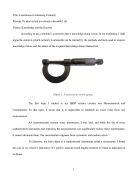I find this (random error) equally incredible because it implies that one cannot even attain full certainty that the true value of any reading lies within the systematic error range (quantified for this micrometre as ±0.01).
This object links to the prompt because it illustrates that awareness of random and systematic error is a barrier to attaining certainty in empirical data collected through measurements. Moreover, because the impact of random error, unlike systematic error, is unquantifiable, the extent to which random error should lower certainty in a measurement is unclear.
Object 2: Photo of Andrew Wiles (born 11th April 1953), the Abel Prize Award winning mathematician who proved Fermat’s Last Theorem.
My second object is a picture of Sir Andrew Wiles, the mathematician who became famous for his proof of Fermat’s Last Theorem. In this picture, he can be seen standing in front of the theorem, which is written on a chalkboard, in his Princeton, N.J., office, back in 1998.2 While Wiles won the Abel Prize in 2016 for his ground-breaking proof of this notorious theorem, the circumstances surrounding the proof made me question the extent to which knowers can attain certainty in knowledge acquired through intuition and deduction; which are thought to be the two most reliable methods of acquiring knowledge.
On June 23rd of 1993, after spending 7 years in solitude, believing he had finally done it, Wiles announced his proof to the world. But his proof contained mistakes that were discovered 3 months later. A year passed before Wiles managed to correct his proof. However, to this day, there are some prominent mathematicians, like Kevin Buzzard, that are convinced nobody really understands the full contents of Wiles’ proof!3
This object links to the prompt because it illustrates that awareness of human fallibility or flaws in human memory is a barrier to certainty even when a knower is convinced that they know something like Wiles was. For even when knowledge is acquired through the reasoning processes of intuition and deduction, which offer the allure of certainty, fallibility (that knowers are prone to making mistakes) may mean full certainty is unattainable. So, in general, an awareness of fallibility should lower the certainty for all knowledge claims retrieved from memory and the extent that fallibility should lower the certainty rises the knottier the knowledge salvaged from memory is and the weaker a knower’s memory quotient
is.
Object 3: My 2022 IBDP 2 Timetable
My third object is my class timetable issued on the 28th of January 2022.
One morning, while my mom was driving me to school, she was curious to know and consequently decided to ask me what classes I was having on that day. Although I had checked my timetable moments before, having been preparing for my exhibition and reflecting on the challenges to attaining certainty, I decided to tell my mother that I was not certain I knew the answer. – For I was considering how all knowledge claims about the future are predicated upon assumptions that cannot be proven true and are not necessarily true either. As the words left my mouth, however, I realised my response was ill-advised. My mother immediately harangued me on the folly of such disorganisation, asserting that “the world has no place for disorganised people” and when I explained to her the reason I was doubting, she informed me that even if I feel uncertain, I should not communicate it because most people have little tolerance for uncertainty.
This object links to the prompt because it illustrates that knowledge claims regarding future events, so-called future contingents, are uncertain by nature, seemingly regardless of how they are acquired. Nevertheless, this object further illustrates that because of societal expectations to behave as if full certainty is attainable in communal knowledge, legitimate reasons to doubt claims are often ignored. Certainty functions in society as a subjective construct rather than an objective construct as I studied it in TOK.
In conclusion, I have argued that from ways knowledge is acquired and the nature of acquired
knowledge itself, it is plausible that full certainty is objectively unattainable. However, in society, full certainty is merely subjective and hence attainable. So, ultimately, to what extent certainty is attainable depends on whether objective or subjective certainty is in mind.
Word count: 950
Bibliography
Reed, B. (2022, February 21). Certainty. Stanford Encyclopedia of Philosophy. Retrieved April 20, 2022, from https://plato.stanford.edu/entries/certainty/
Talbott, W. (2008, March 26). Bayesian epistemology. Stanford Encyclopedia of Philosophy.
Retrieved February 14, 2022, from https://plato.stanford.edu/entries/epistemology-bayesian/
Uzunova-Dang, M., & Uzunov-Dang, S. A. (2020). Ib theory of knowledge. Oxford University
Press.
-
Bhandari, P. (2022, January 4). Random vs. systematic error. Scribbr. Retrieved February 14, 2022, from https://www.scribbr.com/methodology/random-vs-systematic-error/
-
Chappell, B. (2016, March 17). Professor who solved Fermat's last theorem wins math's Abel prize. NPR. Retrieved February 14, 2022, from https://www.npr.org/sections/thetwoway/2016/03/17/470786922/professor-who-solved-fermat-s-last-theorem-wins-math-s-abel-prize
-
Grossman, D. (2021, November 2). What if all published math is ... wrong? Popular Mechanics. Retrieved February 14, 2022, from https://www.popularmechanics.com/science/math/a29252622/ismath-wrong/








